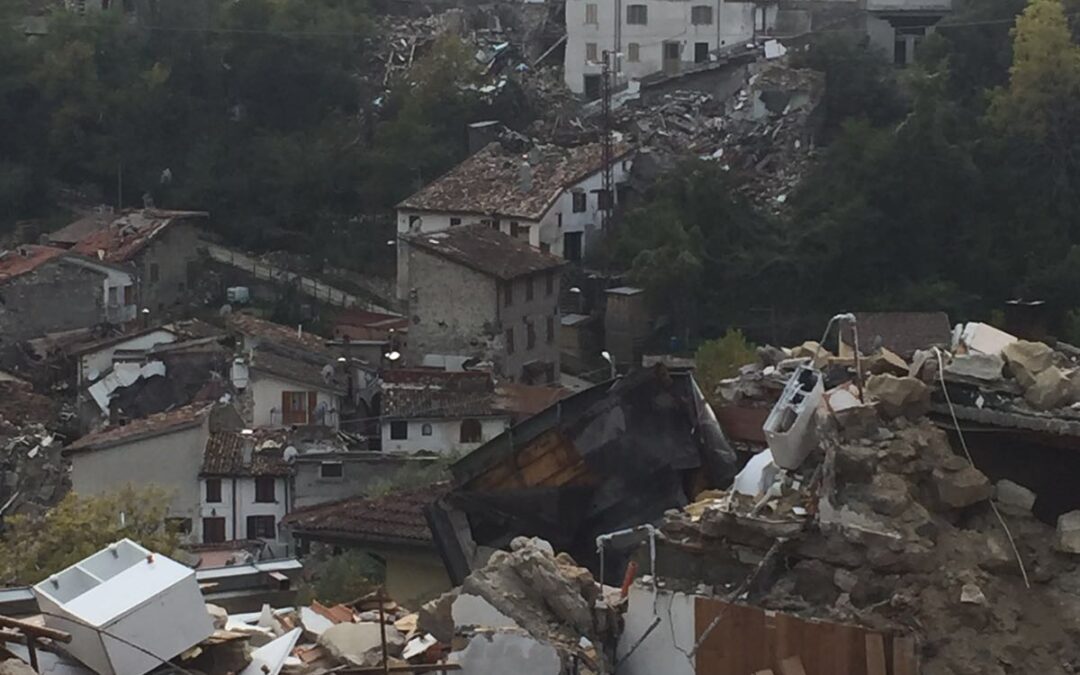
Dec 14, 2016 | Focolare Worldwide
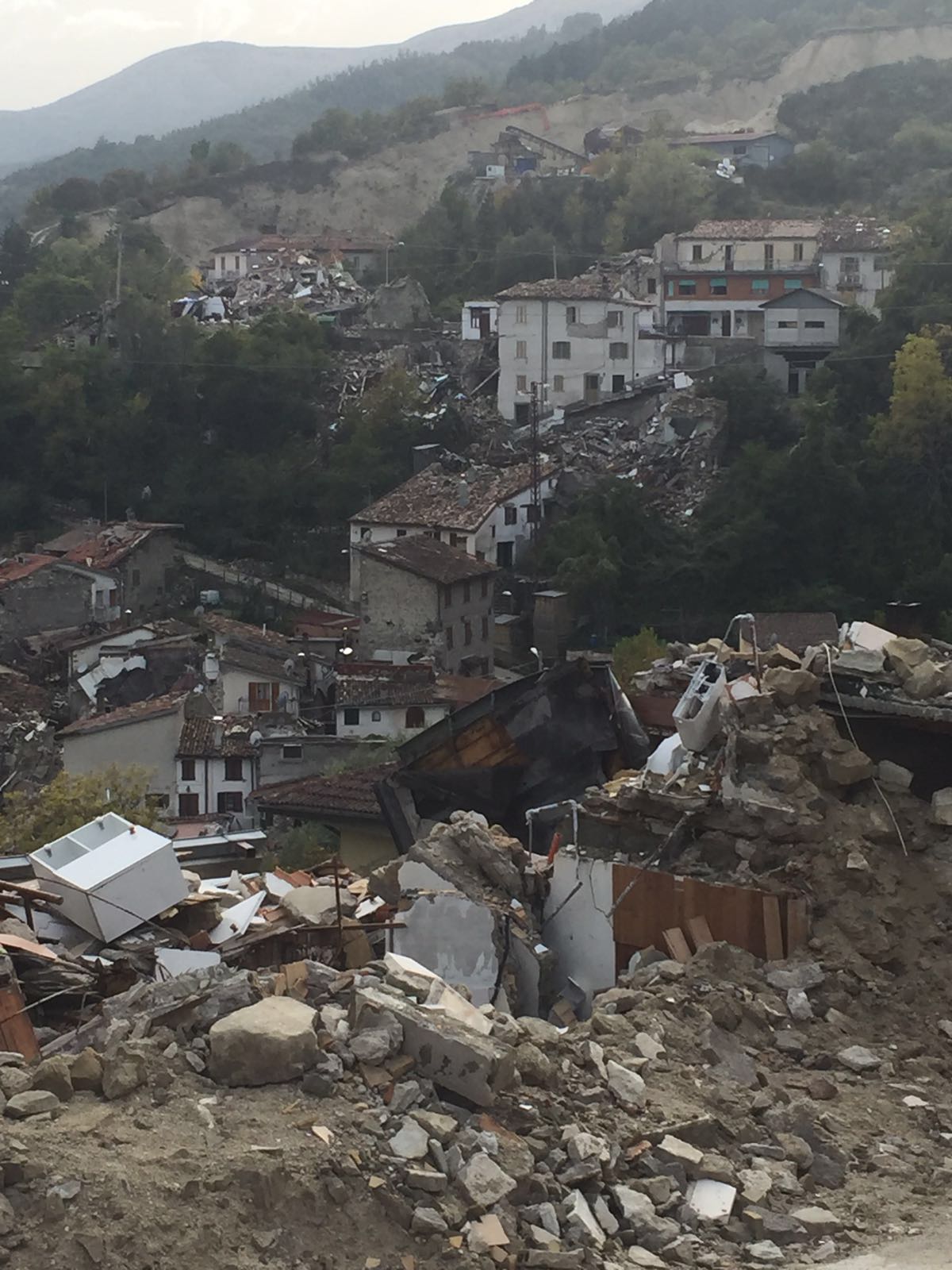 Christmas is also on the way for the displaced victims of the earthquake in Central Italy. We know that you are working in during this after phase of the earthquake. What are you doing? FrancescoTortorella explains: “AMU and AFN have coordinated with the Focolare Movement in Italy, to carry ahead their work during the after phase of the earthquake. Since August, there have been three site surveys in the regions that were hit, to examine the possible ways of intervening. The first intervention that we identified was that of supporting the families that run small agricultural businesses, along with the farm regions that suffered damage.” After a feasibility study, you came up with the comprehensive project. What is it? “We called it RImPresa and it consists of two activities,” Paola Iacovone explains. “The first activity, which will be carried out by the Abbraccio Planetario from Castelli Romani, Italy, and the Bread and Fish Foundation from Ascoli Piceno, Italy, will consist of 4 joint purchasing groups which, through a web portal, will purchase products from the small businesses that were hit by the earthquake, which will provide long-term support to entire families.” There are also many agricultural businesses that were damaged by the earthquake and are finding it hard to start up again. Are you also working on this front? “Yes. The Italian Associazione Italiana Imprenditori per un Economia di Comunione (AIPEC), which we work with is promoting the second activity of RImPresa,” Tortorella adds, “which is only concerned with supporting families with small agricultural and breeding businesses, by providing machinery or small infrastructures. All of it is carried out in coordination with the Italian Civil Protection Agency that has the full picture of the businesses that were damaged and of the assistance that is distributed.” “We’re a small drop in the ocean along with many others,” Paola concludes. “We’ve received many contributions up until now part of which had been destined to help finance the RImPresa Project. There are still funds to carry out other projects that will begin in the next few months. The contributions continue to arrive, so this fund will probably grow in the next few weeks.” Best wishes for a happy Christmas! Gustavo Clariá To collaborate:
Christmas is also on the way for the displaced victims of the earthquake in Central Italy. We know that you are working in during this after phase of the earthquake. What are you doing? FrancescoTortorella explains: “AMU and AFN have coordinated with the Focolare Movement in Italy, to carry ahead their work during the after phase of the earthquake. Since August, there have been three site surveys in the regions that were hit, to examine the possible ways of intervening. The first intervention that we identified was that of supporting the families that run small agricultural businesses, along with the farm regions that suffered damage.” After a feasibility study, you came up with the comprehensive project. What is it? “We called it RImPresa and it consists of two activities,” Paola Iacovone explains. “The first activity, which will be carried out by the Abbraccio Planetario from Castelli Romani, Italy, and the Bread and Fish Foundation from Ascoli Piceno, Italy, will consist of 4 joint purchasing groups which, through a web portal, will purchase products from the small businesses that were hit by the earthquake, which will provide long-term support to entire families.” There are also many agricultural businesses that were damaged by the earthquake and are finding it hard to start up again. Are you also working on this front? “Yes. The Italian Associazione Italiana Imprenditori per un Economia di Comunione (AIPEC), which we work with is promoting the second activity of RImPresa,” Tortorella adds, “which is only concerned with supporting families with small agricultural and breeding businesses, by providing machinery or small infrastructures. All of it is carried out in coordination with the Italian Civil Protection Agency that has the full picture of the businesses that were damaged and of the assistance that is distributed.” “We’re a small drop in the ocean along with many others,” Paola concludes. “We’ve received many contributions up until now part of which had been destined to help finance the RImPresa Project. There are still funds to carry out other projects that will begin in the next few months. The contributions continue to arrive, so this fund will probably grow in the next few weeks.” Best wishes for a happy Christmas! Gustavo Clariá To collaborate:
| Azione per un Mondo Unito ONLUS (AMU) |
Azione per Famiglie Nuove ONLUS (AFN) |
| IBAN: IT16 G050 1803 2000 0000 0120 434 at Banca Popolare Etica |
IBAN: IT55 K033 5901 6001 0000 0001 060 at Banca Prossima |
| Codice SWIFT/BIC: CCRTIT2184D |
Codice SWIFT/BIC: BCITITMX |
| CAUSE : Emergenza terremoto (Italia) |
| All contributions that are deposited in these two accounts for this cause will be jointly administered by AMU and AFN. Except for cash donations, Italian taxpayers can get deductions and allowances from income, in accordance with the regulations for non-profit organizations, to up to 10% of income and the € 70,000.00 annual limit. Tax benefits are provided in many European Union countries and other countries of the world in accordance with local regulations. |
Dec 13, 2016 | Non categorizzato
Upon receiving the news of the death of Bishop Javier Echevarría, prelate of the Opus Dei, yesterday 12 December, the Focolare Movement conveys its heartfelt condolences. Most grateful for his life spent at the service of the Church, Bishop Echevarría, the second successor of St. Josemaría Escribá de Balaguer, founder of the Opus Dei, the Focolare Movement is particularly united in prayer and friendship with the Opus Dei family worldwide.
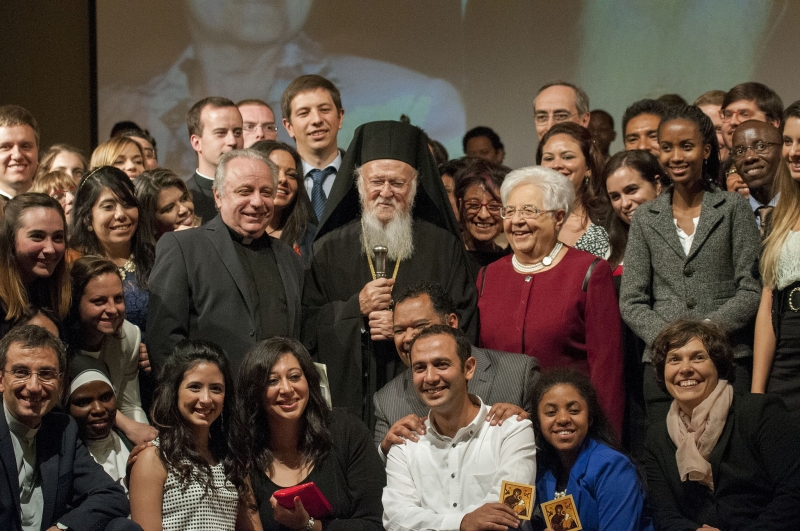
Dec 13, 2016 | Non categorizzato
 “Your Holiness, the Focolare community of Bari salutes you with great affection! We are so gladdened by your visit to our city, which is a bridge between East and West and has a special ecumenical calling. Your presence encourages us to work even more at the service of the full and visible unity among Christians, and for the protection of Creation. The charism of unity that you love so much, spurs us on to work in our own environments as apostles of dialogue who are aware that only unity, love and brotherhood will be able to respond to the challenges of today’s world.” This was the welcoming message from the local Focolare community in Bari as it welcomed the Ecumenical Patriarch Bartholomew on his December 5-6 visit to their city for the feast day of St. Nicholas. It is a “highly significant ecumenical event,” said representatives of the diocese, “that puts the Church of Bari-Bitonto on the map and contributes to dialogue between the Catholic Church and the Orthodox Church.” On December 5th, at the Basilica of St Nicholas the Patriarch gave the opening address for the beginning of the 2016-2017 academic school year of the Pugliese School of Theology, and received the Saint Nicholas Prize from the Ecumenical Institute. He had been awarded the Prize in recognition of his 25 years of ecumenical efforts as a “patient and courageous artisan of the culture of communion.” Pope Francis sent a congratulatory message that was read during the award ceremony in which he praised the efforts of the Patriarch for “the promotion of ever greater communion among those who believe in Christ.” In his keynote address entitled, Adriatic and Ionian Seas of Communion, Bartholomew reflected on the idea of communion, beginning from its theological significance as koinonia, as a “common participation of grace, love and communion in the life of God, that becomes experience itself of ‘being in relationship’.” He also remembered the Great Council of Crete held in June 2016 when “Our Holy Orthodox Church manifested its “communion” [emphasising the word] by unanimous decision of all the Patriarchs of the auto-cephalous Orthodox Churches.” He also underscored the need for an economy of solidarity, saying that “there needs to be an economy of communion which is all embracing and which does not create social discontent in the host country.” On December 6th, at the conclusion of the solemn Eucharistic celebration, presided by Archbishop Franco Cacucci in the same Basilica, Patriarch Bartholomew gave a second talk: “We have also come as pilgrims to the tomb of this great saint,” he said, “to invoke his intercession, his prayer and his support in our Patriarchal service, to thank God with him, for our 25 years of service to the unity of the Church, on St Andrew’s Throne; but also to be strong witnesses to the need of encounter among the disciples of Christ so that the world may believe, and we may one day not so far away, break the Bread of Life together and drink from the same Chalice of Salvation.” Fausta Giardina and Roberto Lago, from the Focolare in Puglia, write: “We’re breathing in a beautiful ecumenical atmosphere in our city during these days. The Patriarch’s visit and the special celebrations have been heartfelt by everyone.” The Focolare’s friendship with the Patriarch is longstanding. On October 26, 2016, Sophia University Institute, Loppiano, conferred its first Honorary Doctorate in the Culture of Unity to Patriarch Bartholomew. On that occasion he said: “One of the ideals of the Focolare Movement is the unity of the Church. Chiara Lubich and her collaborators did much work. She made 23 visits to [Patriarch] Athenagoras in Constantinople. Then she began to visit Dimitrios and then me. In 2008, I visited Chiara at the Gimelli Hospital a few days before her death. I’m sure that she’s with us this evening, with her spiritual presence and with her prayer. She rejoices with us and prays for the unity between our Churches.”
“Your Holiness, the Focolare community of Bari salutes you with great affection! We are so gladdened by your visit to our city, which is a bridge between East and West and has a special ecumenical calling. Your presence encourages us to work even more at the service of the full and visible unity among Christians, and for the protection of Creation. The charism of unity that you love so much, spurs us on to work in our own environments as apostles of dialogue who are aware that only unity, love and brotherhood will be able to respond to the challenges of today’s world.” This was the welcoming message from the local Focolare community in Bari as it welcomed the Ecumenical Patriarch Bartholomew on his December 5-6 visit to their city for the feast day of St. Nicholas. It is a “highly significant ecumenical event,” said representatives of the diocese, “that puts the Church of Bari-Bitonto on the map and contributes to dialogue between the Catholic Church and the Orthodox Church.” On December 5th, at the Basilica of St Nicholas the Patriarch gave the opening address for the beginning of the 2016-2017 academic school year of the Pugliese School of Theology, and received the Saint Nicholas Prize from the Ecumenical Institute. He had been awarded the Prize in recognition of his 25 years of ecumenical efforts as a “patient and courageous artisan of the culture of communion.” Pope Francis sent a congratulatory message that was read during the award ceremony in which he praised the efforts of the Patriarch for “the promotion of ever greater communion among those who believe in Christ.” In his keynote address entitled, Adriatic and Ionian Seas of Communion, Bartholomew reflected on the idea of communion, beginning from its theological significance as koinonia, as a “common participation of grace, love and communion in the life of God, that becomes experience itself of ‘being in relationship’.” He also remembered the Great Council of Crete held in June 2016 when “Our Holy Orthodox Church manifested its “communion” [emphasising the word] by unanimous decision of all the Patriarchs of the auto-cephalous Orthodox Churches.” He also underscored the need for an economy of solidarity, saying that “there needs to be an economy of communion which is all embracing and which does not create social discontent in the host country.” On December 6th, at the conclusion of the solemn Eucharistic celebration, presided by Archbishop Franco Cacucci in the same Basilica, Patriarch Bartholomew gave a second talk: “We have also come as pilgrims to the tomb of this great saint,” he said, “to invoke his intercession, his prayer and his support in our Patriarchal service, to thank God with him, for our 25 years of service to the unity of the Church, on St Andrew’s Throne; but also to be strong witnesses to the need of encounter among the disciples of Christ so that the world may believe, and we may one day not so far away, break the Bread of Life together and drink from the same Chalice of Salvation.” Fausta Giardina and Roberto Lago, from the Focolare in Puglia, write: “We’re breathing in a beautiful ecumenical atmosphere in our city during these days. The Patriarch’s visit and the special celebrations have been heartfelt by everyone.” The Focolare’s friendship with the Patriarch is longstanding. On October 26, 2016, Sophia University Institute, Loppiano, conferred its first Honorary Doctorate in the Culture of Unity to Patriarch Bartholomew. On that occasion he said: “One of the ideals of the Focolare Movement is the unity of the Church. Chiara Lubich and her collaborators did much work. She made 23 visits to [Patriarch] Athenagoras in Constantinople. Then she began to visit Dimitrios and then me. In 2008, I visited Chiara at the Gimelli Hospital a few days before her death. I’m sure that she’s with us this evening, with her spiritual presence and with her prayer. She rejoices with us and prays for the unity between our Churches.”
Gustavo Clariá
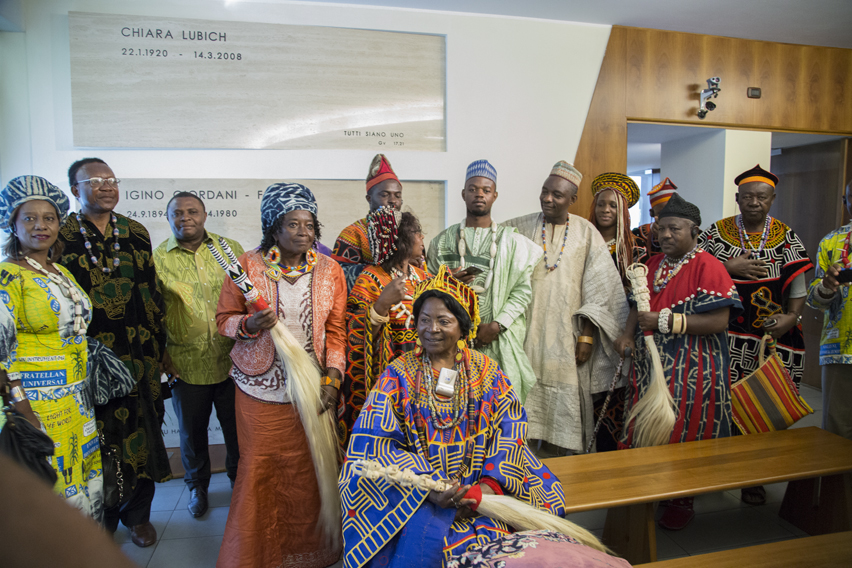
Dec 12, 2016 | Focolare Worldwide
 “Through the Focolare Movement, God has visited the Bangwa people (…).They have lived the pact of mutual love with the Bangwa people and taught them the spirituality of unity and universal brotherhood (…).They have reduced the infant mortality within these years from close to 90% to almost zero; they have tirelessly worked hard to eliminate the deadly Tsetse Fly that made Fontem look like the valley of death; thousands of Lebialem people would not have had a good education without them; good health facilities have been at our door steps all these years (…).Now is the time to celebrate the love of God for all the Lebialem people”. These quotes are taken from the letter written by Mgsr. Andrew Nkea, Bishop of Mamfe to announce the year 2016 as a Jubilee year of thanksgiving to God for the arrival of the Focolare Movement amongst the Bangwa people. In this letter, one finds a prayer to be recited daily together the Bishop’s words that highlight the most important moments of these 50 years of history and recall the protagonists and all those who gave their lives towards them. It also expresses the feelings of the Fons – the kings of the territories of this region -,of persons holding positions of responsibility and of the entire population.
“Through the Focolare Movement, God has visited the Bangwa people (…).They have lived the pact of mutual love with the Bangwa people and taught them the spirituality of unity and universal brotherhood (…).They have reduced the infant mortality within these years from close to 90% to almost zero; they have tirelessly worked hard to eliminate the deadly Tsetse Fly that made Fontem look like the valley of death; thousands of Lebialem people would not have had a good education without them; good health facilities have been at our door steps all these years (…).Now is the time to celebrate the love of God for all the Lebialem people”. These quotes are taken from the letter written by Mgsr. Andrew Nkea, Bishop of Mamfe to announce the year 2016 as a Jubilee year of thanksgiving to God for the arrival of the Focolare Movement amongst the Bangwa people. In this letter, one finds a prayer to be recited daily together the Bishop’s words that highlight the most important moments of these 50 years of history and recall the protagonists and all those who gave their lives towards them. It also expresses the feelings of the Fons – the kings of the territories of this region -,of persons holding positions of responsibility and of the entire population. 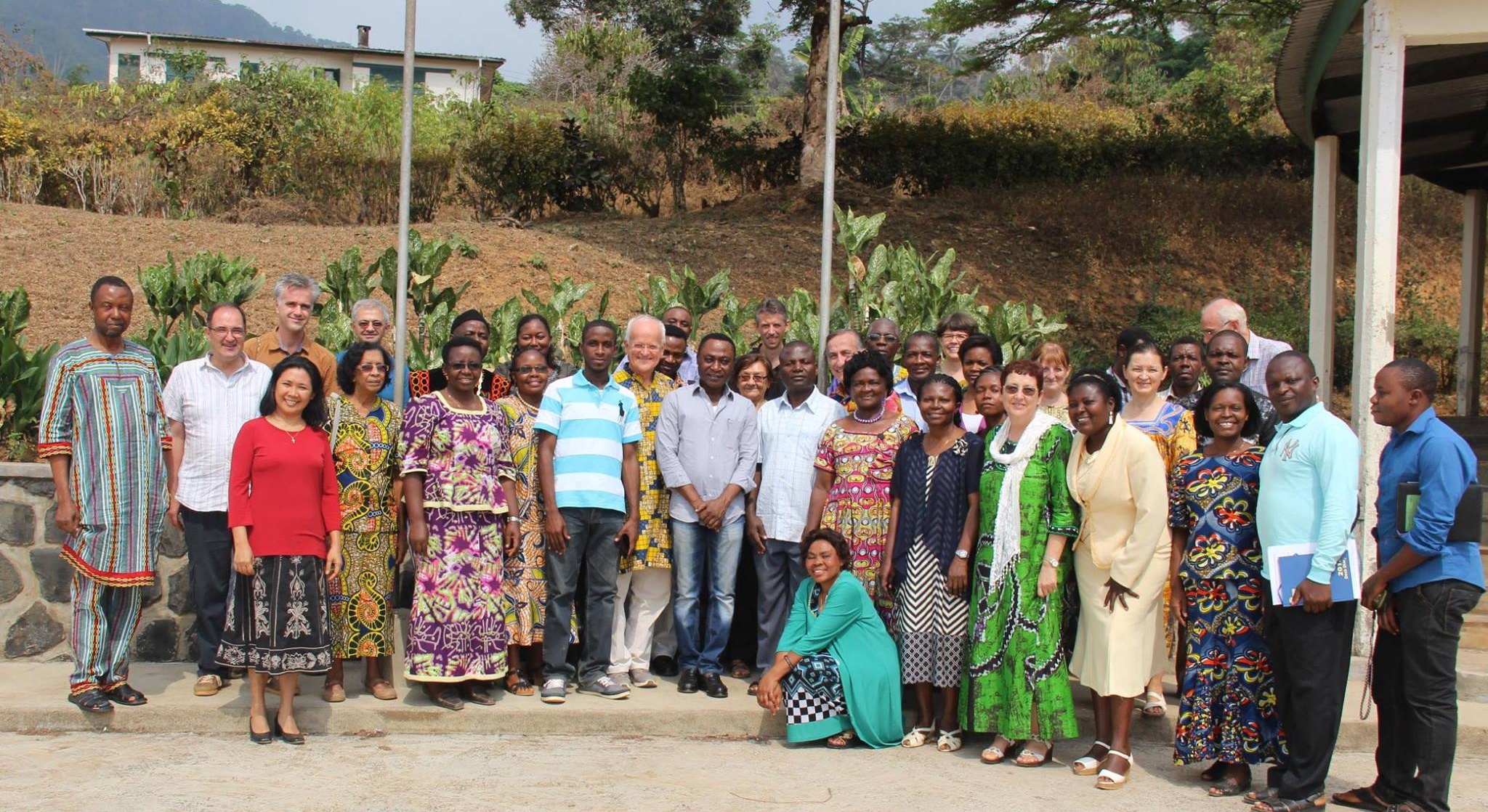 The first focolarini doctors arrived in Fontem in 1966. The state of emergency of the Bangwa people became a priority for the whole Focolare Movement. Chiara Lubich paid her first visit to Fontem that same year and she was given a great welcome by the king, Fon Defang, important personalities and the whole population. She visited Fontem another two times. In May 2000, when she addressed all the Bangwa, gathered in the wide open space in front of the Fon’s palace, she said: “I feel that I cannot leave you without having made a solemn pact with you. A strong and binding pact of mutual love. It is a sort of oath by which we promise to be always fully at peace with one another and to be always ready to make peace and start again whenever our promise is broken”. This jubilee year will come to its end with a solemn celebration to be held from the 14 to 17 December 2016. The Fons and other heads of institutions have been actively involved in the preparation of this celebration, which was presented to the Prime Minister, Philémon Yang at Yaoundé last October. Since then, it is being recognized as a national event. The programme includes: the success of Our Lady Seat of Wisdom College, which, with 500 students per year, is among the best five pre-university institutions in the anglophone Cameroonian system; life and work experiences of the Focolare Movement in Fontem; an International Conference on Interreligious Dialogue between Christianity and the African Traditional Religion, in these last 50 experience among the Bangwa people. Today, the inculturation of Christianity seems to have become more obvious. Martin Nkafu, the African philosopher and theologian, director of the department of Human and Social Sciences in the International Research Area at the Pontifical Lateran University in Rome, says: “Christianity has not changed the people’s mentality; a Bangwa who adheres to Christ keeps his personality, his culture, and has an integrated vision of reality; and as Pope John Paul II said in Nairobi in 1982, this allows him to be authentically African and deeply Christian”.
The first focolarini doctors arrived in Fontem in 1966. The state of emergency of the Bangwa people became a priority for the whole Focolare Movement. Chiara Lubich paid her first visit to Fontem that same year and she was given a great welcome by the king, Fon Defang, important personalities and the whole population. She visited Fontem another two times. In May 2000, when she addressed all the Bangwa, gathered in the wide open space in front of the Fon’s palace, she said: “I feel that I cannot leave you without having made a solemn pact with you. A strong and binding pact of mutual love. It is a sort of oath by which we promise to be always fully at peace with one another and to be always ready to make peace and start again whenever our promise is broken”. This jubilee year will come to its end with a solemn celebration to be held from the 14 to 17 December 2016. The Fons and other heads of institutions have been actively involved in the preparation of this celebration, which was presented to the Prime Minister, Philémon Yang at Yaoundé last October. Since then, it is being recognized as a national event. The programme includes: the success of Our Lady Seat of Wisdom College, which, with 500 students per year, is among the best five pre-university institutions in the anglophone Cameroonian system; life and work experiences of the Focolare Movement in Fontem; an International Conference on Interreligious Dialogue between Christianity and the African Traditional Religion, in these last 50 experience among the Bangwa people. Today, the inculturation of Christianity seems to have become more obvious. Martin Nkafu, the African philosopher and theologian, director of the department of Human and Social Sciences in the International Research Area at the Pontifical Lateran University in Rome, says: “Christianity has not changed the people’s mentality; a Bangwa who adheres to Christ keeps his personality, his culture, and has an integrated vision of reality; and as Pope John Paul II said in Nairobi in 1982, this allows him to be authentically African and deeply Christian”. Among the initiatives achieved during this year, one finds the Fons’ pilgrimage to Rome. They came last September to celebrate the Jubilee of Mercy with Pope Francis and to visit the places of Mafua Ndem, “the queen sent by God”, as Fon Lucas Njifua of Fontem called Chiara Lubich on her last visit to Cameroon. A competition, entitled “God’s intervention in the history and life of the Nweh Mundani people” has also been organized and promoted throughout the year among students in all primary and secondary schools. 4000 people were involved in this project, which included poetry, songs, literary compositions and quizes; 700 students from 21 schools participated through their various works. This event mobilizes and brings together even the Bangwa people who during the last years left Cameroon. A Development Commission, with members in Cameroon and in other countries, has started to dialogue with State bodies in view of concrete actions regarding education, health, youth and women’s status. This 50th anniversary celebration is being followed by the Focolare Community world-wide. The president, Maria Voce has closely accompanied the preparation for it, while Jesús Morán and the Central council members responsible for Africa will be present in Fontem. Sources: Press releases (SIF)
Among the initiatives achieved during this year, one finds the Fons’ pilgrimage to Rome. They came last September to celebrate the Jubilee of Mercy with Pope Francis and to visit the places of Mafua Ndem, “the queen sent by God”, as Fon Lucas Njifua of Fontem called Chiara Lubich on her last visit to Cameroon. A competition, entitled “God’s intervention in the history and life of the Nweh Mundani people” has also been organized and promoted throughout the year among students in all primary and secondary schools. 4000 people were involved in this project, which included poetry, songs, literary compositions and quizes; 700 students from 21 schools participated through their various works. This event mobilizes and brings together even the Bangwa people who during the last years left Cameroon. A Development Commission, with members in Cameroon and in other countries, has started to dialogue with State bodies in view of concrete actions regarding education, health, youth and women’s status. This 50th anniversary celebration is being followed by the Focolare Community world-wide. The president, Maria Voce has closely accompanied the preparation for it, while Jesús Morán and the Central council members responsible for Africa will be present in Fontem. Sources: Press releases (SIF)
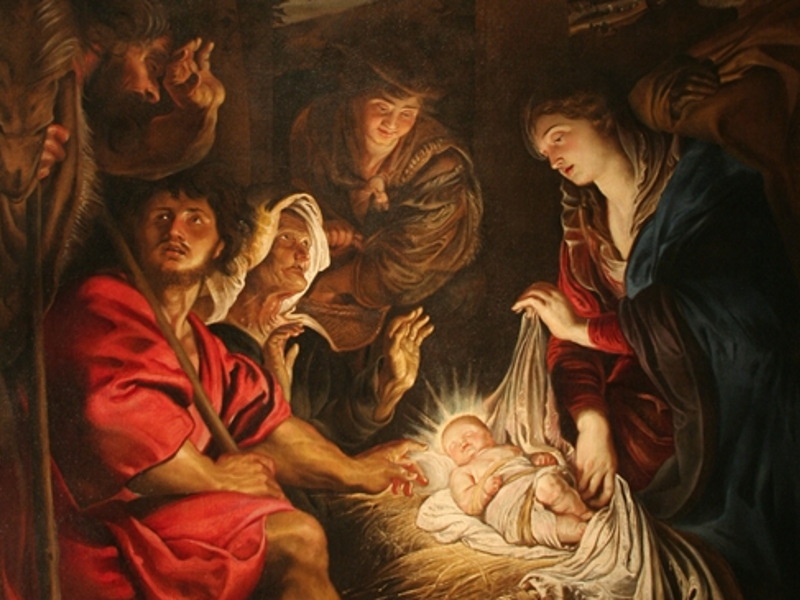
Dec 11, 2016 | Non categorizzato
 For the ancients Christ was a king. But the real Christ was outside normal schemes. He was born in a stable among shephereds and beasts, and his mother was the daughter of peasants. Whereas other sovereigns loomed from above, stepping down from carriages and thrones to rule, he came from below, from the lowest class, to serve. He was under everyone so that he could be the universal servant: His kingliness consisted of service. Everything is simple and enchanting as a fairy tale in this birth of a boy child in the middle of a windy night, in the middle of the nights of time. And everything is tragic and revolutionary, because this birth foreshadows a scaffold. This son of the king, son of God, comes forth from humble beings in a makeshift shelter, like some refugee pushed away by farthing folk and unnoticed by the wretched: this is by no means a new revolution. When the Saviour appeared, a great light lit up the night.The night remains, but so does the light. It’s always Christmas in the Christian world, and Christmas brings joy amidst tears still today. When God descends among us, we re-ascend to God; He humanizes and we are divinized. The meeting point is His heart. Jesus was born in a stall to demonstrate that he could also be born in our heart that is sometimes a rather squallid place. And whenever he’s born in our heart the angels rise to sing as they did over the stable that night while the moon shone in the night and peace rained down on the earth. In a similar way, the Word – Reason – incarnates among us today and can transform a stall into a Heavenly anti-chamber. Igino Giordani Le Feste S.E.I. (1954) p. 36.
For the ancients Christ was a king. But the real Christ was outside normal schemes. He was born in a stable among shephereds and beasts, and his mother was the daughter of peasants. Whereas other sovereigns loomed from above, stepping down from carriages and thrones to rule, he came from below, from the lowest class, to serve. He was under everyone so that he could be the universal servant: His kingliness consisted of service. Everything is simple and enchanting as a fairy tale in this birth of a boy child in the middle of a windy night, in the middle of the nights of time. And everything is tragic and revolutionary, because this birth foreshadows a scaffold. This son of the king, son of God, comes forth from humble beings in a makeshift shelter, like some refugee pushed away by farthing folk and unnoticed by the wretched: this is by no means a new revolution. When the Saviour appeared, a great light lit up the night.The night remains, but so does the light. It’s always Christmas in the Christian world, and Christmas brings joy amidst tears still today. When God descends among us, we re-ascend to God; He humanizes and we are divinized. The meeting point is His heart. Jesus was born in a stall to demonstrate that he could also be born in our heart that is sometimes a rather squallid place. And whenever he’s born in our heart the angels rise to sing as they did over the stable that night while the moon shone in the night and peace rained down on the earth. In a similar way, the Word – Reason – incarnates among us today and can transform a stall into a Heavenly anti-chamber. Igino Giordani Le Feste S.E.I. (1954) p. 36.
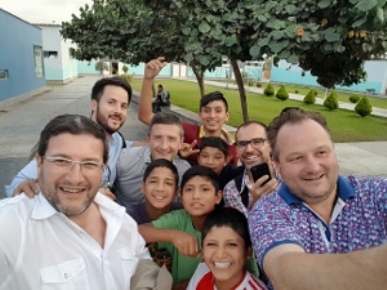
Dec 9, 2016 | Non categorizzato
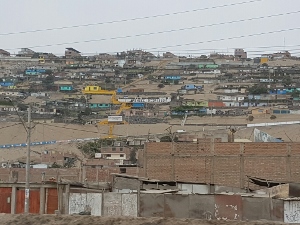 Lying at the outskirts of Lima is a district that takes its name from the pre-Inca Sanctuary built in Pachacamac (in the quecha language meaning ”god who created the earth”). «We got here with the objective of starting up a business run according to the practices of the Economy of Communion (EoC), the profits of which are able to support a rehab center for children saved from the streets and with drug addiction problems, » recounted Germán Jorge of the EoC Argentina. The Mundo Libre Institute is the only one of its kind existing in Perù today. It has been awarded international recognition for the professionalism with which it has performed its activities, but despite the possibility to host 100 children, today it supports only 40 due to lack of resources. Its foundress, Marilú Gonzalez Posada, has lived for 32 years with this objective. Her great concern regards the Institute’s sustainability, a problem common to all the social organizations that are unable to survive only on the generosity of people and international cooperation. One of the laboratories of Mundo Libre produces typical Peruvian sweets: the “chocotejas.” «The business plan we are working on, specifically involves this project to be implemented at the end of 2017, together with Solidarpole (which promotes different solidarity business projects and has proposed that the Economy of Communion be the choice) and AMU Luxembourg (that offered finances for the renovation of a barn and purchase of machinery). We now have to coordinate the resources. It is a challenge to EoC that has a lot to offer, and a communion which is not “imposed” but “generated” in response to a first free decision. This is what we have tried to do with each person we encounter along the way this week.». When the armed Spanish arrived on horseback in these lands to conquer the Pachacamac Totem – the indios who had never seen horses before, believed they were the gods who had come to replace their god, and did not counter with any resistance. History has left its mark on their culture. «We could see this in the relational difficulties. So our main commitment was to give room to all, in the effort to break the logic of the “European conquistador” (or the descendants of these), and of passive and underdog aborigines. As the days passed, and on the basis of relationships of trust which slowly developed, we started to overcome these relational dynamics and build new rapports of reciprocity.»
Lying at the outskirts of Lima is a district that takes its name from the pre-Inca Sanctuary built in Pachacamac (in the quecha language meaning ”god who created the earth”). «We got here with the objective of starting up a business run according to the practices of the Economy of Communion (EoC), the profits of which are able to support a rehab center for children saved from the streets and with drug addiction problems, » recounted Germán Jorge of the EoC Argentina. The Mundo Libre Institute is the only one of its kind existing in Perù today. It has been awarded international recognition for the professionalism with which it has performed its activities, but despite the possibility to host 100 children, today it supports only 40 due to lack of resources. Its foundress, Marilú Gonzalez Posada, has lived for 32 years with this objective. Her great concern regards the Institute’s sustainability, a problem common to all the social organizations that are unable to survive only on the generosity of people and international cooperation. One of the laboratories of Mundo Libre produces typical Peruvian sweets: the “chocotejas.” «The business plan we are working on, specifically involves this project to be implemented at the end of 2017, together with Solidarpole (which promotes different solidarity business projects and has proposed that the Economy of Communion be the choice) and AMU Luxembourg (that offered finances for the renovation of a barn and purchase of machinery). We now have to coordinate the resources. It is a challenge to EoC that has a lot to offer, and a communion which is not “imposed” but “generated” in response to a first free decision. This is what we have tried to do with each person we encounter along the way this week.». When the armed Spanish arrived on horseback in these lands to conquer the Pachacamac Totem – the indios who had never seen horses before, believed they were the gods who had come to replace their god, and did not counter with any resistance. History has left its mark on their culture. «We could see this in the relational difficulties. So our main commitment was to give room to all, in the effort to break the logic of the “European conquistador” (or the descendants of these), and of passive and underdog aborigines. As the days passed, and on the basis of relationships of trust which slowly developed, we started to overcome these relational dynamics and build new rapports of reciprocity.» The «Formulation of the “Business administration guidelines” helped in setting the person at the core of economic activities, without foregoing professionalism and the efficiency necessary to reach the targets. After passing days together, our interlocutors at the Mundo Libre Institute said that they already felt part of the Economy of Communion project, which in a sense, they had already unconsciously put into practice and which they now want to propose to their own employees and also educate the youth in these principles. ‘This is our challenge in 2017’». «The horses not originating from Perù, had to develop the capacity to walk on sand in these desert zones. Throughout these 500 years an equine breed has developed with the characteristic concentric-circles gait which allows them to move freely in these environments. We are like the first horses and are making a big effort to learn how to live the “culture of giving” in communion. But if we develop these abilities, many others will slowly follow in many parts of the globe. They will carry this new culture in their blood, and will succeed in changing the world.» Gustavo Clariá
The «Formulation of the “Business administration guidelines” helped in setting the person at the core of economic activities, without foregoing professionalism and the efficiency necessary to reach the targets. After passing days together, our interlocutors at the Mundo Libre Institute said that they already felt part of the Economy of Communion project, which in a sense, they had already unconsciously put into practice and which they now want to propose to their own employees and also educate the youth in these principles. ‘This is our challenge in 2017’». «The horses not originating from Perù, had to develop the capacity to walk on sand in these desert zones. Throughout these 500 years an equine breed has developed with the characteristic concentric-circles gait which allows them to move freely in these environments. We are like the first horses and are making a big effort to learn how to live the “culture of giving” in communion. But if we develop these abilities, many others will slowly follow in many parts of the globe. They will carry this new culture in their blood, and will succeed in changing the world.» Gustavo Clariá
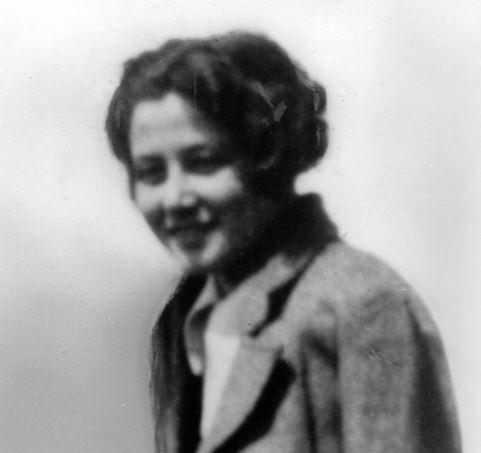
Dec 7, 2016 | Non categorizzato
 “I was 19 years old and had a great thirst for God.” Her thirst was so strong that every time she met a priest she would tell him: “Talk to me about God.” Urged by that thirst she intended to study at the Catholic University, but since her family did not have the financial means, she participated in a lottery to obtain a scholarship, but she was one point short. “I remember the cry I had, because I was thinking that at the Catholic University they would talk about God. And I recall that in the midst of that cry as I sat in the lounge with my mother, I heard someone inside me say: “I will be your Teacher.” A few months later she went to Loreto with a young women’s group that she belonged to. There is a very large shrine located there in central Italy which is said to contain the little house of Nazareth where the Holy Family lived. Chiara recounts that when she stepped into that little house, something extraordinary happened within her. “I was overcome with emotion, such great emotion that it seemed like was being crushed by the Divine that I contemplated all around me. The idea had come alive inside me that Jesus had perhaps walked over there, that those walls had listened to the echo of Mary’s songs, Joseph, the Annunciation, the angel…. the feeling was so alive that all I could do was cry.” That cry was provoked “by the weight of the Divine that crushed down on me.” She said that during the days in Loreto, “whenever I could, I escaped” to the little house and experienced the same strong sensation that God was opening a new path that had to do with that sacred place with the Holy Family that dwelled there. On the day before her departure, Chiara went to the Shrine and found it filled with people. She stood in the back of the church and, in that moment she heard the voice of God in her heart: “A host of virgins will follow you.” Over the years, she would realize that these were the first signs of the new path that the Lord was preparing: the focolare. Four years later, in 1943, something else happened, a simple but decisive event. Her mother asked Chiara’s younger sisters to fetch some milk, but it was cold outside and they didn’t want to go. She didn’t ask Chiara because she wanted her to study, but Chiara felt urged to love, and offered to go get the milk. “Along the way,” she says, “I felt as if God was saying to me; Give yourself to me, give your whole self to me.” I stopped surprised. I went to get the milk, then returned home and wrote a very fiery letter to a priest,” in which I recounted to him what I was feeling in my soul. At that time, when someone wanted to consecrate themself to God, they were advised to do it for a certain period of time and then renew each year until it became a more and more certain commitment. Chiara was so determined in that letter and so taken by God’s love, that she managed to convince the priest to give her permission to consecrate herself to God for life. It was December 7, 1943 when she went alone to early morning Mass, as a “big storm was raging.” “I had the impression that the world was against me,” Chiara would recall. “A small pew had been prepared for me near to the altar, and I had a small missal in my hand. They made me recite the formula that I give myself totally to God forever. I was so happy, I didn’t realize what I was doing, because I was young. Only after pronouncing the formula I had the impression that a bridge had fallen behind, that I could never turn back because now I belonged all to God. And there one tear fell on the small missal. But the happiness was just immense!” Chiara concluded her recount of that December 7, 1943, which marks the beginning of the Focolare Movement: “I marry God, so I expect everything possible good thing. It will be a divine adventure. I marry God! And later we saw that it had really been just that.” Gustavo Clariá
“I was 19 years old and had a great thirst for God.” Her thirst was so strong that every time she met a priest she would tell him: “Talk to me about God.” Urged by that thirst she intended to study at the Catholic University, but since her family did not have the financial means, she participated in a lottery to obtain a scholarship, but she was one point short. “I remember the cry I had, because I was thinking that at the Catholic University they would talk about God. And I recall that in the midst of that cry as I sat in the lounge with my mother, I heard someone inside me say: “I will be your Teacher.” A few months later she went to Loreto with a young women’s group that she belonged to. There is a very large shrine located there in central Italy which is said to contain the little house of Nazareth where the Holy Family lived. Chiara recounts that when she stepped into that little house, something extraordinary happened within her. “I was overcome with emotion, such great emotion that it seemed like was being crushed by the Divine that I contemplated all around me. The idea had come alive inside me that Jesus had perhaps walked over there, that those walls had listened to the echo of Mary’s songs, Joseph, the Annunciation, the angel…. the feeling was so alive that all I could do was cry.” That cry was provoked “by the weight of the Divine that crushed down on me.” She said that during the days in Loreto, “whenever I could, I escaped” to the little house and experienced the same strong sensation that God was opening a new path that had to do with that sacred place with the Holy Family that dwelled there. On the day before her departure, Chiara went to the Shrine and found it filled with people. She stood in the back of the church and, in that moment she heard the voice of God in her heart: “A host of virgins will follow you.” Over the years, she would realize that these were the first signs of the new path that the Lord was preparing: the focolare. Four years later, in 1943, something else happened, a simple but decisive event. Her mother asked Chiara’s younger sisters to fetch some milk, but it was cold outside and they didn’t want to go. She didn’t ask Chiara because she wanted her to study, but Chiara felt urged to love, and offered to go get the milk. “Along the way,” she says, “I felt as if God was saying to me; Give yourself to me, give your whole self to me.” I stopped surprised. I went to get the milk, then returned home and wrote a very fiery letter to a priest,” in which I recounted to him what I was feeling in my soul. At that time, when someone wanted to consecrate themself to God, they were advised to do it for a certain period of time and then renew each year until it became a more and more certain commitment. Chiara was so determined in that letter and so taken by God’s love, that she managed to convince the priest to give her permission to consecrate herself to God for life. It was December 7, 1943 when she went alone to early morning Mass, as a “big storm was raging.” “I had the impression that the world was against me,” Chiara would recall. “A small pew had been prepared for me near to the altar, and I had a small missal in my hand. They made me recite the formula that I give myself totally to God forever. I was so happy, I didn’t realize what I was doing, because I was young. Only after pronouncing the formula I had the impression that a bridge had fallen behind, that I could never turn back because now I belonged all to God. And there one tear fell on the small missal. But the happiness was just immense!” Chiara concluded her recount of that December 7, 1943, which marks the beginning of the Focolare Movement: “I marry God, so I expect everything possible good thing. It will be a divine adventure. I marry God! And later we saw that it had really been just that.” Gustavo Clariá
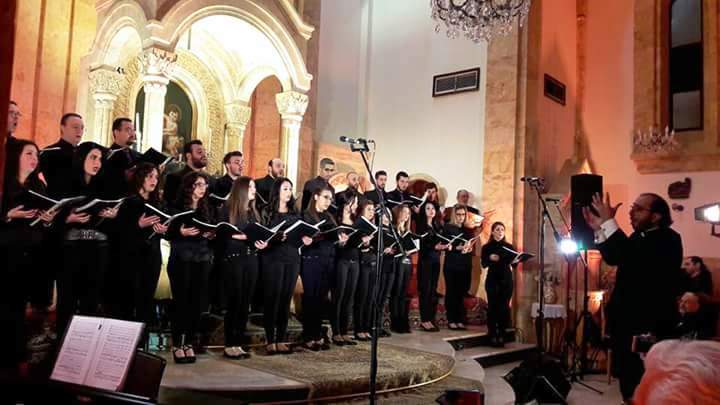
Dec 6, 2016 | Non categorizzato
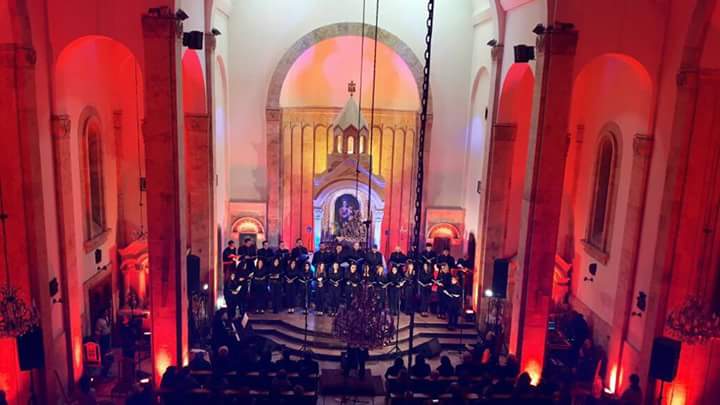 I attended for the first time, a classical music concert in the midst of a battle. It happened in Aleppo, where, surrounded by death, a voice of peace arose among many others that announced war, to comfort the hearts of the people and make them momentarily forget the cold and death. It was like a chapter of a modern tragedy that resembled Greek mythology. In a fully packed Church and with very few tools, Father Elias Janji with the Naregatsi choir and the pianist played some pieces of Verdi, Mozart, Vivaldi and Karl Orf, elevating our spirits to another horizon, despite the polar chill that has invaded Aleppo these days.. And to think that not too far away, the tragedy continues with missiles launched from Eastern Aleppo over the Western zone, killing school children and innocent people, while in the Eastern part of the city, the Syrian army continues to attack. Thousands of people (an estimated 60,000 up to today) managed to escape from East Aleppo and take refuge in the Western zone. They tell of how many have been taken as hostages and that some of those who were shot in their backs while escaping, were killed. Others escaped amid the gunfire, carrying their grandmas or other elderly relatives on their shoulders. The people were relieved since they could finally return to their own homes that were liberated in these days while the army took hold of the city’s water pumping station, even if it was mined. Water is forecasted to return to the city in a month’s time, after the technicians have completed their work. Thus a chapter of the tragedy will end, though there will surely be many more.
I attended for the first time, a classical music concert in the midst of a battle. It happened in Aleppo, where, surrounded by death, a voice of peace arose among many others that announced war, to comfort the hearts of the people and make them momentarily forget the cold and death. It was like a chapter of a modern tragedy that resembled Greek mythology. In a fully packed Church and with very few tools, Father Elias Janji with the Naregatsi choir and the pianist played some pieces of Verdi, Mozart, Vivaldi and Karl Orf, elevating our spirits to another horizon, despite the polar chill that has invaded Aleppo these days.. And to think that not too far away, the tragedy continues with missiles launched from Eastern Aleppo over the Western zone, killing school children and innocent people, while in the Eastern part of the city, the Syrian army continues to attack. Thousands of people (an estimated 60,000 up to today) managed to escape from East Aleppo and take refuge in the Western zone. They tell of how many have been taken as hostages and that some of those who were shot in their backs while escaping, were killed. Others escaped amid the gunfire, carrying their grandmas or other elderly relatives on their shoulders. The people were relieved since they could finally return to their own homes that were liberated in these days while the army took hold of the city’s water pumping station, even if it was mined. Water is forecasted to return to the city in a month’s time, after the technicians have completed their work. Thus a chapter of the tragedy will end, though there will surely be many more.  December 4 is the feast of St. Barbara, the young girl martyred in the first centuries of Christianity, pierced with a sword by her father since, as a follower of Jesus, she had refused to adore another God. It is a great feast for the Christians of the East, adults and children who, despite the war, gathered together to honour her in a masquerade and recount her story in song – a story which despite the centuries passed – has not changed very much. We can’t help but wonder, what has remained of man and his dignity? What will happen now? Will the war in Aleppo end, and bring back serenity to the people who have suffered so much, even if they will find a great part of the city destroyed? The population is weary and wants the conflict to end. But the armed groups refuse to accept defeat and want to fight to the last, despite the appeal of the UN special envoy, Staffan De Mistura, to all the groups to leave the city and spare the lives of the people, who would otherwise pay a heavy price, according to the logic of war! How can we forget that in the end, it is Man since each one, whether good or bad, is an image of God, though this image is buried under a thousand vices and wickedness. With Christmas now at our doorstep, let us therefore remind ourselves that this feast should not only be a remembrance of a past fact celebrated with the usual festivity. The arrival of the “Prince of Peace” should also change the hearts and gestures of all of us, because these become tiny stones in the construction of a better world we all dream of. From Aleppo, Pascal Bedros
December 4 is the feast of St. Barbara, the young girl martyred in the first centuries of Christianity, pierced with a sword by her father since, as a follower of Jesus, she had refused to adore another God. It is a great feast for the Christians of the East, adults and children who, despite the war, gathered together to honour her in a masquerade and recount her story in song – a story which despite the centuries passed – has not changed very much. We can’t help but wonder, what has remained of man and his dignity? What will happen now? Will the war in Aleppo end, and bring back serenity to the people who have suffered so much, even if they will find a great part of the city destroyed? The population is weary and wants the conflict to end. But the armed groups refuse to accept defeat and want to fight to the last, despite the appeal of the UN special envoy, Staffan De Mistura, to all the groups to leave the city and spare the lives of the people, who would otherwise pay a heavy price, according to the logic of war! How can we forget that in the end, it is Man since each one, whether good or bad, is an image of God, though this image is buried under a thousand vices and wickedness. With Christmas now at our doorstep, let us therefore remind ourselves that this feast should not only be a remembrance of a past fact celebrated with the usual festivity. The arrival of the “Prince of Peace” should also change the hearts and gestures of all of us, because these become tiny stones in the construction of a better world we all dream of. From Aleppo, Pascal Bedros
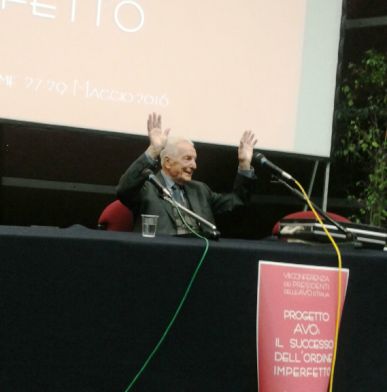
Dec 5, 2016 | Focolare Worldwide, Senza categoria
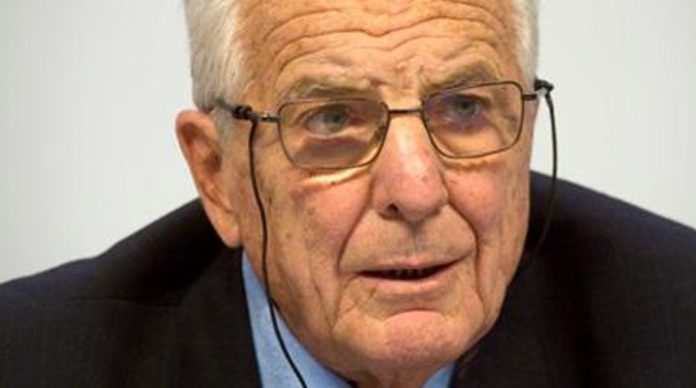 Erminio Longhini was born in Milan, Italy, on July 19, 1928. After his marriage with Nuccia, he and his wife had three children: Michela, Matteo and Stefano. While they were still university students, Nuccia and Erminio were determined to keep the human person at the centre of their professional life. “Ever since I was a child,” Erminio himself admits, “I felt strongly drawn to the Virgin Mary.” Perhaps this explains his filial devotion to “so beautiful a Mother” that even though he was buried in professional responsibilities, he offered to accompany the sick on their journeys to Lourdes. He was serious, scrupulous, demanding and went through years of hard sacrifice working from morning until deep into the night serving the sick and doing research. But his soul was also searching. He and Nuccia felt the need for a spirituality that could accompany the life of their family. They found their answer in the Focolare, in God-Love to whom Erminio felt called to give himself completely, and to serve all the brothers and sisters he would meet. He became a married focolarino. Thanks to generous contributions he set up an internal medicine department with modern equipment and welcomed young graduates from Italy and developing countries. He managed to engage colleagues and nurses until the medical division he directed became one of the best in both technical quality and in human relationships, with hundreds of published research projects. Erminio understood more and more that it was not enough to care for the patient, but for the human being.
Erminio Longhini was born in Milan, Italy, on July 19, 1928. After his marriage with Nuccia, he and his wife had three children: Michela, Matteo and Stefano. While they were still university students, Nuccia and Erminio were determined to keep the human person at the centre of their professional life. “Ever since I was a child,” Erminio himself admits, “I felt strongly drawn to the Virgin Mary.” Perhaps this explains his filial devotion to “so beautiful a Mother” that even though he was buried in professional responsibilities, he offered to accompany the sick on their journeys to Lourdes. He was serious, scrupulous, demanding and went through years of hard sacrifice working from morning until deep into the night serving the sick and doing research. But his soul was also searching. He and Nuccia felt the need for a spirituality that could accompany the life of their family. They found their answer in the Focolare, in God-Love to whom Erminio felt called to give himself completely, and to serve all the brothers and sisters he would meet. He became a married focolarino. Thanks to generous contributions he set up an internal medicine department with modern equipment and welcomed young graduates from Italy and developing countries. He managed to engage colleagues and nurses until the medical division he directed became one of the best in both technical quality and in human relationships, with hundreds of published research projects. Erminio understood more and more that it was not enough to care for the patient, but for the human being.  In collaboration with the Catholic University he carried out research in 40 hospitals, which revealed that patients’ greatest handicap was feeling dependent on others: “Why not spend a bit of our time building a human relationship, a loving exchange between us and our patients?” With some difficulty and many complications, Erminio managed to come up with the first 30 volunteers to care for the sick beyond there purely medical needs. “What did I try to convey to them?” He explains: “What I had learned from Chiara Lubich: reciprocity.” The Hospital Volunteers Association emerged from that first group, in 1976. His work was encouraged not only by Chiara Lubich, but by Cardinals Colombo and Martini from Milan, and by John Paul II himself who, during an audience for 7,000 volunteers, said to Erminio: “I’m pleased, tell your friends to continue like this.” Following the painful death of his wife, Erminio’s meekness and abandonment to God deepened. Forced to have more frequent medical visits and transfusions, he confided: “I feel like an autumn leaf on a windy day. It might seem more desirable that the evening of life should come. Then, I realize that there’s a temptation hiding there, and in the morning I realize that another day is being given to me and that life is living the present moment, counting on God’s mercy for the past and for the hopes of the future.” In the meantime, the Hospital Volunteers Association spread all over Italy and now has 25,000 volunteers in 250 hospitals. Because of his commitment, in 2004, Erminio was awarded the Gold Medal of Merit Award for Health by the President of Italy. Until the end Erminio continued to offer spiritual encouragement to the volunteers through video messages and writings. In the final months his medical condition was not reassuring, but he was serene: “I thank God because I had much more in my life than what I would have imagined. I thank the Blessed Mother, and every night I finish my prayers saying to her: “Let it be You to come and get me, and it will be pure joy. I’ll hear You and see You!” He died on November 4th. Everybody that knew and loved him, are certain that it happened just as he had desired in payment for a life seeped in the Gospel. The current president of the association writes: “A great man has left us, a man who was able to perceive with his sensitivity, humanity and faith the invisible essence that eye cannot see, nor even the mind. But he doesn’t leave us alone, each of us will meet him in their service to others if we manage to allow all the wisdom, knowledge and depth that Erminio always conveyed and taught to bear fruit.” Anna Friso
In collaboration with the Catholic University he carried out research in 40 hospitals, which revealed that patients’ greatest handicap was feeling dependent on others: “Why not spend a bit of our time building a human relationship, a loving exchange between us and our patients?” With some difficulty and many complications, Erminio managed to come up with the first 30 volunteers to care for the sick beyond there purely medical needs. “What did I try to convey to them?” He explains: “What I had learned from Chiara Lubich: reciprocity.” The Hospital Volunteers Association emerged from that first group, in 1976. His work was encouraged not only by Chiara Lubich, but by Cardinals Colombo and Martini from Milan, and by John Paul II himself who, during an audience for 7,000 volunteers, said to Erminio: “I’m pleased, tell your friends to continue like this.” Following the painful death of his wife, Erminio’s meekness and abandonment to God deepened. Forced to have more frequent medical visits and transfusions, he confided: “I feel like an autumn leaf on a windy day. It might seem more desirable that the evening of life should come. Then, I realize that there’s a temptation hiding there, and in the morning I realize that another day is being given to me and that life is living the present moment, counting on God’s mercy for the past and for the hopes of the future.” In the meantime, the Hospital Volunteers Association spread all over Italy and now has 25,000 volunteers in 250 hospitals. Because of his commitment, in 2004, Erminio was awarded the Gold Medal of Merit Award for Health by the President of Italy. Until the end Erminio continued to offer spiritual encouragement to the volunteers through video messages and writings. In the final months his medical condition was not reassuring, but he was serene: “I thank God because I had much more in my life than what I would have imagined. I thank the Blessed Mother, and every night I finish my prayers saying to her: “Let it be You to come and get me, and it will be pure joy. I’ll hear You and see You!” He died on November 4th. Everybody that knew and loved him, are certain that it happened just as he had desired in payment for a life seeped in the Gospel. The current president of the association writes: “A great man has left us, a man who was able to perceive with his sensitivity, humanity and faith the invisible essence that eye cannot see, nor even the mind. But he doesn’t leave us alone, each of us will meet him in their service to others if we manage to allow all the wisdom, knowledge and depth that Erminio always conveyed and taught to bear fruit.” Anna Friso
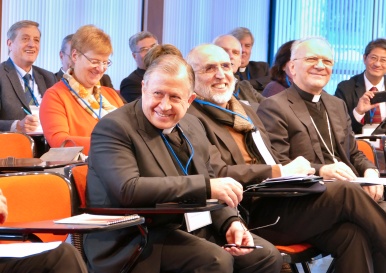
Dec 3, 2016 | Non categorizzato
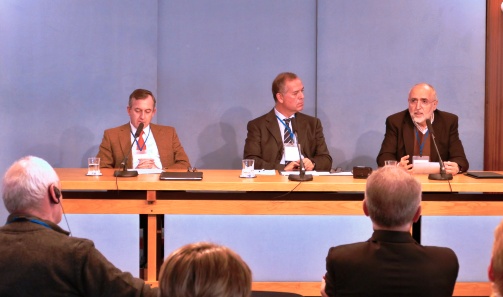
From left: Jorge López e Alberto García (Regnum Chisti), Jesús Morán (Focolari)

From left: D. Edoardo Robles Gil, General Director of the Legionaries of Christ- Regnum Christi with Jesús Morán and Archbishop Vincenzo Zani.

 Christmas is also on the way for the displaced victims of the earthquake in Central Italy. We know that you are working in during this after phase of the earthquake. What are you doing? FrancescoTortorella explains: “AMU and AFN have coordinated with the Focolare Movement in Italy, to carry ahead their work during the after phase of the earthquake. Since August, there have been three site surveys in the regions that were hit, to examine the possible ways of intervening. The first intervention that we identified was that of supporting the families that run small agricultural businesses, along with the farm regions that suffered damage.” After a feasibility study, you came up with the comprehensive project. What is it? “We called it RImPresa and it consists of two activities,” Paola Iacovone explains. “The first activity, which will be carried out by the Abbraccio Planetario from Castelli Romani, Italy, and the Bread and Fish Foundation from Ascoli Piceno, Italy, will consist of 4 joint purchasing groups which, through a web portal, will purchase products from the small businesses that were hit by the earthquake, which will provide long-term support to entire families.” There are also many agricultural businesses that were damaged by the earthquake and are finding it hard to start up again. Are you also working on this front? “Yes. The Italian Associazione Italiana Imprenditori per un Economia di Comunione (AIPEC), which we work with is promoting the second activity of RImPresa,” Tortorella adds, “which is only concerned with supporting families with small agricultural and breeding businesses, by providing machinery or small infrastructures. All of it is carried out in coordination with the Italian Civil Protection Agency that has the full picture of the businesses that were damaged and of the assistance that is distributed.” “We’re a small drop in the ocean along with many others,” Paola concludes. “We’ve received many contributions up until now part of which had been destined to help finance the RImPresa Project. There are still funds to carry out other projects that will begin in the next few months. The contributions continue to arrive, so this fund will probably grow in the next few weeks.” Best wishes for a happy Christmas! Gustavo Clariá To collaborate:
Christmas is also on the way for the displaced victims of the earthquake in Central Italy. We know that you are working in during this after phase of the earthquake. What are you doing? FrancescoTortorella explains: “AMU and AFN have coordinated with the Focolare Movement in Italy, to carry ahead their work during the after phase of the earthquake. Since August, there have been three site surveys in the regions that were hit, to examine the possible ways of intervening. The first intervention that we identified was that of supporting the families that run small agricultural businesses, along with the farm regions that suffered damage.” After a feasibility study, you came up with the comprehensive project. What is it? “We called it RImPresa and it consists of two activities,” Paola Iacovone explains. “The first activity, which will be carried out by the Abbraccio Planetario from Castelli Romani, Italy, and the Bread and Fish Foundation from Ascoli Piceno, Italy, will consist of 4 joint purchasing groups which, through a web portal, will purchase products from the small businesses that were hit by the earthquake, which will provide long-term support to entire families.” There are also many agricultural businesses that were damaged by the earthquake and are finding it hard to start up again. Are you also working on this front? “Yes. The Italian Associazione Italiana Imprenditori per un Economia di Comunione (AIPEC), which we work with is promoting the second activity of RImPresa,” Tortorella adds, “which is only concerned with supporting families with small agricultural and breeding businesses, by providing machinery or small infrastructures. All of it is carried out in coordination with the Italian Civil Protection Agency that has the full picture of the businesses that were damaged and of the assistance that is distributed.” “We’re a small drop in the ocean along with many others,” Paola concludes. “We’ve received many contributions up until now part of which had been destined to help finance the RImPresa Project. There are still funds to carry out other projects that will begin in the next few months. The contributions continue to arrive, so this fund will probably grow in the next few weeks.” Best wishes for a happy Christmas! Gustavo Clariá To collaborate: 


 “Through the Focolare Movement, God has visited the Bangwa people (…).They have lived the pact of mutual love with the Bangwa people and taught them
“Through the Focolare Movement, God has visited the Bangwa people (…).They have lived the pact of mutual love with the Bangwa people and taught them 





 I attended for the first time, a classical music concert in the midst of a battle. It happened in
I attended for the first time, a classical music concert in the midst of a battle. It happened in 


